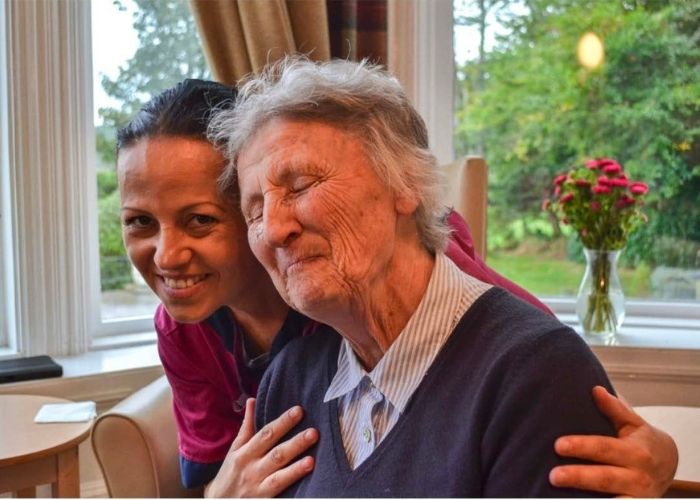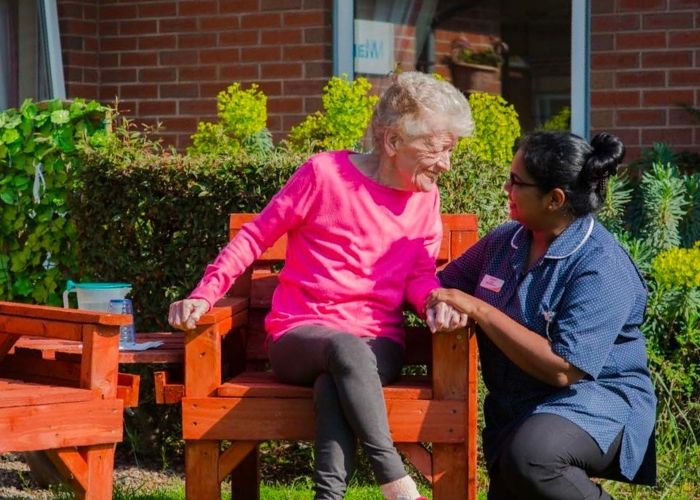Looking for a dementia care home
When looking for a dementia care home for your loved one, there’s much to consider.
In this article we cover the importance of reviewing the regulatory report, ensuring staff receive specialist dementia training and that all care is personalised to individual needs.
Here’s a summary of what we’ll cover:
- Look for a residential care home with trained dementia care staff to ensure specialist and person-centred care for your loved one.
- Review CQC ratings and follow our 10 tips for choosing the right care for an individual with dementia.
- Consider any possible future needs, look into a dual residential/nursing home.
- Visit your preferred dementia care home several times, making sure to speak to the carers, the manager and the residents, if possible
- Trust your instincts. You know your loved one’s needs and you will be the best judge of whether a home is suitable or not.

Why does my loved one need a dementia care home?
There are several reasons someone living with dementia might need to move into a dementia care home.
Often care needs have progressed to a point that 24-hour care is more appropriate. Or maybe, after a hospital admission, mobility has declined, and returning to their own home is no longer practical.
Sometimes isolation is a factor. Perhaps the person living with dementia is beginning to feel lonely at home, and would benefit from living within a more community-like setting.
Whatever reason it is, a move to a care home needs careful consideration from everyone involved.
When do you start your search for a dementia care home?
It is advisable to start planning for a move into a care home as soon as deemed appropriate.
If decisions are left until the last minute, it could be stressful for the person living with dementia, as well as those around them.
It is always important to include your loved one in discussions and decisions about their long-term care. This can be distressing for the individual concerned, so do not rush or force the conversation.
Consider the individual needs of the person living with dementia at every step of their care journey.
What kinds of care homes are there?
The two main types of care homes are residential and nursing care homes:
Residential care is a home-style environment offering trained carers to assist with daily tasks and personal care. This can include washing, dressing, using the bathroom and taking medication.
There will be activities on offer, such as baking, gardening, arts and crafts and music.
Nursing care offers the same homely atmosphere and help with daily tasks as a residential home. In addition, they also offer clinical support from qualified nurses 24-hours a day.
Both types of home usually also have staff trained in providing specialist dementia care.
Specialist dementia care homes
There are also specialist dementia care homes. They provide all the usual residential offerings, but support the additional needs of people living with dementia.
The home will have a dementia-friendly environment. Including features that support wayfinding, and promote independence.
Dementia care homes may also have living spaces specifically designed to reduce agitation or distress. Plus, there may be additional safety measures in place.
Other care homes have a mixed offering, with residential care support for all, and nursing care if needed.
Dual registered home
Keep a dual registered home in mind even if your loved one is in good health now. Nursing care may be needed in the future.
This helps ensure continuity of care for your loved one, as they can stay somewhere familiar even if their needs change.
Private companies, voluntary or charitable organisations can run residential or nursing care homes.
Local authorities also run their own care homes of any type.
How do I find a specialist dementia care home?
Social Services can provide you with a list of local care homes in the first instance. These may be both private and local authority run.
Some specialist care homes have particular expertise in supporting those living with dementia.
Your GP may have advice or look for recommendations from family and friends for dementia care homes in your local area.
You may choose to visit care homes that are not specialist in dementia care. These could still be a viable option for your loved one. Think about discovering how they can tailor their care to a person living with dementia.
For instance, ask how many of their carers are specially trained in dementia care. You could then ask to speak directly to one or two of their team to find out about their qualifications.

Look for the regulatory report
First, remember that you can visit a care home a few times if you would like to, not just once. It is a big decision, so if possible, take your time to research each home you are interested in.
Check out the Care Quality Commission’s (CQC) recent inspection reports on the care homes you are visiting. This will give you valuable information on how the home operates, and what sort of care you can expect.
The CQC is the regulator for English care homes and marks them according to a strict set of criteria. Their reports will show you any areas that might be a concern, as well as areas of excellence.
If you are visiting homes in Scotland then you should review the Care Inspectorate reports for that home. The Care Inspectorate is responsible for ensuring that each home provides safe and high-quality care.
Get a second opinion
Consider making a list of your own particular criteria for care before you visit the care home. Perhaps take some notes while you are there. You might like to take along a trusted companion to support you. They may be able to offer another perspective for the visit.
Ask the manager any questions you have about your loved one’s future at the home. They will elaborate on any information provided in the home’s brochure or website.
You should also be able to speak to some members of staff about day-to-day life there. Some Residents may also be willing to have a chat about their activities and levels of comfort within the home.
10 ways to choose a dementia care home
If you’re wondering about the best type of dementia care home then here’s 10 areas to consider to help you make the appropriate decision for your loved one.
1. What is the CQC or Care Inspectorate rating of the home? Read through the regulatory reports and this will show you what the home excels at and where it needs improvement.
2. Does the care team have specialist dementia training? People living with dementia have specific care needs so it is vital that the care team receive appropriate training. Ask the home manager about their training programme. During your visits, talk with the care team to gauge if your loved one will feel comfortable with them. Observe them and see if the staff seem engaged and caring with residents.

Person-centred care
3. Look for person-centred care. This means that the care on offer caters to each individual’s needs and is flexible to their requirements. It is not a one-size fits all approach. Care should aim to support an appropriate level of independence, while also meeting all care requirements. Each resident should receive a care plan that outlines all their specific needs.
4. Is the home a connected community? What resources are available to help keep residents in regular contact with family and friends, such as access to video calls, telephones and computers? Are visits well planned and comfortable for the resident? Does the home welcome children or pets as visitors?
5. Consider the size and quality of the bedrooms. Are they private bedrooms or shared facilities? Does the room have a view or access to a garden area? Will there be room for personal effects or even some items of furniture? Are toilets and bathrooms ensuite, and well located for easy access?

Nutrition and diet
6. Is there any nutrition and diet support on offer? Appropriate nutrition is vital to ensure wellbeing is maintained throughout later life. Meal plans and dietary advice should be provided as part of personalised care plans. Ask to see a sample plan. Perhaps observe a meal time so you can see what food is served and what the dining experience is like.
7. What are the facilities of the home like overall? Check out the gardens and communal spaces such as dining and activity areas. If these areas are well planned and welcoming, this could be a tick on your list of desired criteria. The gardens need to be safe to walk around and accessible for those with mobility issues. Are there activities that you are permitted to attend to get an idea of what is on offer? Knowing these details can help you find the right dementia care home for your loved one.
8. Ask about social interactions in the home. Is socialising encouraged in shared areas? Is there an activities coordinator specialising in dementia-friendly activities? Are visitors encouraged to join in with their loved one during organised activities?

Spiritual wellbeing
9. Do they provide spiritual or religious support? You may also want to consider any spiritual or cultural rituals your loved one enjoys. Ask how the home caters for cultural or religious practices? Are individual or religious food preferences provided for?
10. Choose a convenient location. The location of the care home can be important if family and friends intend to visit your loved one frequently. Is it local enough to facilitate easy travel to the home? Transport links for people to visit might also be important to check out, as well as parking facilities. Is there a local village or town nearby? You may wish to take your loved one on trips to local shops or a cafe.
Summary
Planning and choosing the most suitable dementia care home for a loved one can be an overwhelming experience. Don’t rush your decision. Consider all the areas discussed in this article and you’ll be well positioned to select the most appropriate care setting.
Remember to trust your instincts. You have your loved one’s best interests at heart, and know their preferences. Alongside the quality of facilities, staff and care, your knowledge of your loved one is the final piece of the puzzle. Taken all together, this will guide you to choose the best dementia care home for your loved one.






